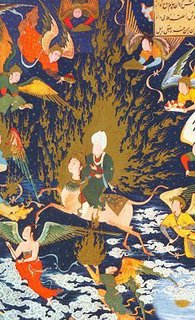
The current uproar raging across the Middle East in response to numerous animated drawings of Muhammad, peace be upon him, is nearly as shocking as the pictures themselves. Islamic tradition prohibits any illustrations or statues from depicting prophets of God, be they positive or negative. In fact, as far as the three monotheistic, prophetic religions are concerned, such depictions are unique to Christianity and its Roman influence. Jesus, himself, peace be upon him, would have never condoned his image being constructed, especially seeing as it has been used to promote white supremacy, though his skin is described as resembling burnt brass and his hair is likened to wool in the Book of Revelations (1:14-15). While in University, I befriended an Orthodox Jewish woman from Israel who was greatly disturbed at the sight of so many Jesus statues dominating the campus landscape. Be that as it may, the right to free speech allows it, as does freedom of religion, thanks be to God.
One basic note to consider while attempting to make sense of the Muslim backlash against the European countries where the cartoons were published is the notion of freedom, so often taken for granted by those of living in the west. These places have no concept of freedom of speech nor press. When confronted with such material, people who lack the freedom of information are easily roused (certainly, the level of desensitization to vile acts, seen in the west, is nothing to be proud of, however). Although the Editor-in-Chief of Jyllands-Posten, the first to publish the cartoons, has long since apologized, his doing so falls significantly short of criminal charges and UN sanctions called for by the riotous crowds responsible for torching embassies and killing innocent bystanders- heinous actions, forbidden by Islamic teaching. What these people fail to understand is that the concept of free speech is simply that: free. There is no law, either Danish or under the UN that prohibits free speech, nor should there be. Unlike many examples conjured up post 911, this case does, indeed, illustrate a clash of civilizations.
As a westerner, and a Muslim, I might add, who includes personal freedom among the highest of principles, it is my belief that free speech must never be impeded. Yes, illustrations of the Prophet with a bomb in his turban, suggesting that he was a terrorist, are repulsive; yes, it is irresponsible for any newspaper to publish anti-Islamic depictions of this nature considering the current climate of discrimination directed against Muslims, yet, to react with violence in the name of defending Islam is equally offensive to the point of becoming antithetical. It begs the question: would Muhammad himself be more outraged by the defamation of his character portrayed in a newspaper, or images of Muslims committing senseless acts of violence in his honor?
Building on this scenario is the desperate need for self-evaluation within the international Muslim community. Should we not be more outraged by the lack of equality that exists within so-called Islamic states or the corruption which maintains the status quo leadership in places like Saudi Arabia and Sudan? Should we not be more ashamed that the fifth pillar of our faith, Zakat, or charity, has fallen, resulting in the severe poverty ravaging our sisters and brothers throughout Asia and Africa, for is it not a fact that the majority of charitable funding originates from those who can hardly feed their own families? Is it not more repulsive to see Muslims carrying out atrocities in Bali or a tribal council in Pakistan sentencing Mukhtar Mai, a Muslim sister, to gang rape for violations of classism committed by her brother and then furthering the insult by acquitting the men who violated her in a state court? Would it not make more sense to march against the embassies of Pakistan and Saudi Arabia?
Perhaps no other occurrence so easily demonstrates the urgent need for reform within the Islamic community than the ones we've seen in the news this week. Those imams who have called for calm and put themselves in harm's way should be commended. The fact, however, that people are forbidden many personal freedoms in the Muslim world illustrates what can happen when the open exchange of ideas is prohibited albeit by many of these same imams. Several of those who have involved themselves in the violent protests have been forbidden to even view the drawings in question. On man in Jordan was actually arrested for re-publishing them; he didn't condone them, he only wanted people to see what they were so outraged against. As Muslims, we are instructed by the Qur'an to treat all of God's Prophets with the same degree of honor (2:285), yet I don't recall Muslims voicing outrage when other prophets have been degraded. When the Brooklyn Art Museum exhibited offensive caricatures of Jesus and his mother, the Holy Virgin Mary, may peace be with them, Muslims should have been equally as disgusted.

The point is, we as an Ummah have much more serious problems plaguing us. I support protesting against inflammatory depictions of the Prophet, peace be upon him, but not by indulging in violence. Boycott goods produced in Norway and Denmark, as one sister who was interviewed by the BBC is doing; call for the end of anti-Muslim bigotry and march in front of embassies- but above all fight for personal freedoms and democratic reform within our own communities. Fight for an end to poverty and inequity. Fight against those carrying out atrocities under the banner of Islam. In short, let's get our house in order before we allow it to collapse above us.
No comments:
Post a Comment